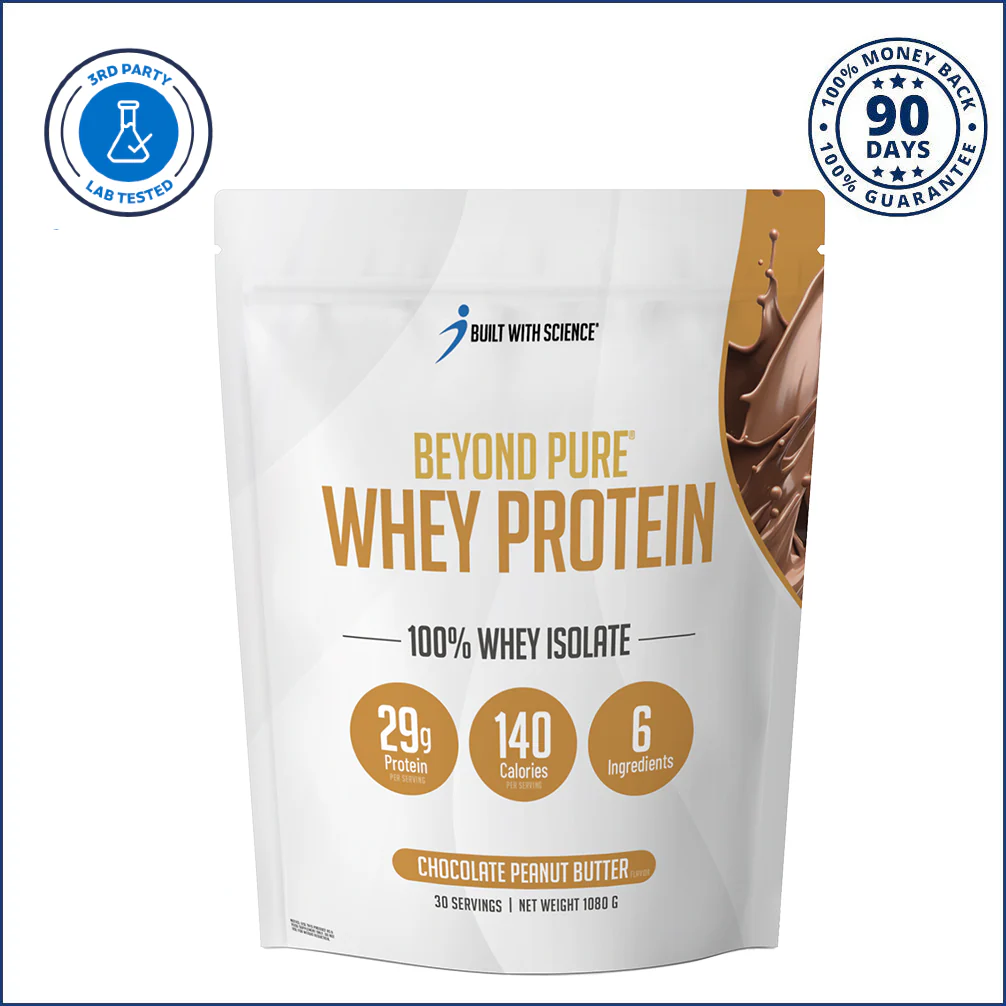
The Anti-Aging Powder? Benefits of Collagen Peptides
If you want to stay young, healthy, and pain-free for the rest of your life...then you should learn about all the benefits of collagen peptides. Let’s dive in:
Since the dawn of mankind, humans have been trying to slow down aging. But despite our best efforts, we’ve failed time after time. Sadly, no matter what you do, you get old.
All of us - smart, strong, or beautiful as we are - will one day die. But it’s much worse than that. Because the aging process can be miserable.
Over time, we’re helplessly forced to watch our bodies betray us. Our skin shrivels up, bones weaken, joints degrade, and muscles wither away.
And the thing is, nobody’s safe. Since even the healthiest athletes can lose their speed, strength, and mobility to injuries.
But what if I told you that it didn’t have to be like this? And that in fact, you could have stronger bones, joints, muscles, and skin as you age. Or that really, with minimal effort, you can stay younger for longer.
Well today, because of collagen peptides, that’s possible.
Now, you might be wondering: what is collagen, and how can it help slow aging?
So luckily for you, this article gets into all the benefits of collagen. Plus, we explain how you can use collagen supplements to maintain your youth.
But, of course, when it comes to looking young, it’s not all about the skin. Staying physically active – and looking in shape – is also a key factor. That’s why I’ve designed every BWS program to be an all-in-one, science-based process that’ll get you to your dream physique FAST. And best of all? It’s all rooted in science. For more information:
Click the button below to take my analysis quiz to discover the best program for you:
↓
WHAT IS COLLAGEN?
First off, collagen is a structural protein. But further, it’s the primary structural protein found in animals.
In fact, collagen is the most common protein in the human body.

But it’s not only found in humans. As many different animal foods contain collagen peptides. Like pig skin, for example.
Sadly though, there aren’t many collagen rich foods. And as such, people have to supplement with collagen.
So, when people talk about collagen peptides, they likely mean the supplement. That is, hydrolyzed collagen: a protein sold in pill or powder form.
Now sometimes, hydrolyzed collagen can be called collagen hydrolysate. Just know that they’re the same thing.
So all told, collagen is a common protein found in animals. But hydrolyzed collagen is a popular protein supplement. And as you’ll learn, it’s a supplement that you should take if you want to age well...
But I’m getting way ahead of myself. Let’s first talk about all the different collagen types:
DIFFERENT TYPES OF COLLAGEN PEPTIDES
Believe it or not, there are many types of collagen. And every type has a different function.
For example, collagen type-1 can help rebuild tendons, ligaments, and bones. Meanwhile though, collagen types 2, 3, and 4 each help repair cartilage and skin.
But to be clear, over 90% of our bodily collagen is type-1. Which is more than any other collagen type by far.
So, there are 28 different types of collagen, all with unique functions. But collagen types 1-5 are the most common ones. With collagen type-1 being the most common of all.
And as you’ll see later, the type of collagen that you buy might matter. Since, based on your goals, different collagen types may give you more or less benefit. But first, let’s go over what collagen can do in the body...
WHAT DOES COLLAGEN DO?
In general, collagen peptides help support our skin, connective tissues, muscles, and bones.
To start off, collagen molecules can combine to form strands, called fibrils. Then, these fibrils merge to form collagen fibers, which give structure to our connective tissues and skin. And lastly, our connective tissues tie our muscles to our bones. Thus, giving your body the support that it needs.
So, that's how our bodies are held together. Again, it all starts with collagen peptides.
And as such, ~33% of your body’s protein is collagen. But further, your skin is ~75% collagen in dry weight.
Now truly, these collagen fibers serve just one main purpose. That is, to help us withstand stretching.
Hence, collagen fibrils must be strong and flexible. But what's more, gram for gram, collagen type-1 is even stronger than steel.
All told, we’re largely made up of collagen in dry weight. And these collagen peptides help keep our bodies strong over time. So below, we’ll show you exactly why that matters so much.
HOW DO COLLAGEN SUPPLEMENTS WORK?
In short, collagen peptides work by boosting collagen synthesis. That is, when you take a collagen supplement, collagen synthesis goes up.
But, you might be thinking:
WHAT IS COLLAGEN SYNTHESIS?
To be clear, collagen synthesis is the body’s collagen-making process. So when collagen synthesis goes up, your body makes more collagen. It’s that basic.
But note, collagen synthesis can be really important. Since that's what gives you all the benefits of collagen peptides. Which, will be clear to you in a bit.
WHY COLLAGEN SYNTHESIS IS SO IMPORTANT
The thing is, our bodies make less and less collagen as we age. You see, collagen synthesis goes down over time, and we no longer make enough collagen to meet our needs. Which, as you'll soon learn, can create many issues [2]:

For one, our skin gets dried up and wrinkled over time. But worse, our blood vessels, tendons, and skin each grow fragile without collagen.
Further though, our bones and joints break down faster as the years go by. And so, we become more prone to injury or nagging pains. Then, in extreme cases, collagen synthesis dysfunction may even cause our bodies to break down.
So, collagen peptides give our bodies much needed structural support. And when we don’t make enough collagen, we run into trouble.
But rest easy, because collagen hydrolysate can help....
SUMMARY:
- There are 28 different types of collagen. And each type has its own function. But up to 90% of our body's collagen is type-1. Such that collagen types 1-5 are the most common by far.
- Collagen gives support to our skin, bones, and connective tissues. And in fact, it's the most common protein in the body - making up 33% of your body's protein.
- With the strength of steel, collagen allows us to withstand stretching. Which helps keep our bodies strong over time.
- When you take a collagen supplement, your body makes more collagen. And this process of making collagen is known as collagen synthesis.
- But as we age, our bodies fail to make all the collagen that we need. So, our skin dries up, tendons grow fragile, and joints break down faster over time. Which can leave us prone to unwanted pain and injuries.
But on the bright side, hydrolyzed collagen can help…
WHAT IS COLLAGEN GOOD FOR?
People have said many wild things about collagen. In fact, collagen lovers have claimed that it helps with everything from fat loss to gut health. And even hair growth, for instance. But, are they right about all that?
Does collagen truly give you the benefits that many claim it does?
Well, you’re about to find out...
COLLAGEN AND SKIN CARE: WHAT DOES COLLAGEN DO FOR YOUR SKIN?
More so than anything else, collagen supplements are known for their effects on skin. And, believe it or not, that's for very good reason.
In fact, of all collagen-related topics, skin is the most well-researched. Really…
There are a bunch of human studies here [1,2,3,4,5,6,7,8,9,10,11,12,13,14,15,16,17,18,19,20,21,22,23,24].
But what’s more: all but one study shows that collagen supplements can help with skin care. That is, hydrolyzed collagen benefits skin health almost every single time.
So, most studies agree. Showing that collagen supplements are good for skin health.
And that better yet, collagen peptides don’t just improve skin health. But in fact, you notice that your skin looks better with collagen.

Below, we’ll quickly go over how collagen supplements can help revive your skin.
RESEARCH SUMMARY
When we look at all the research, we see a few main findings. And all show the benefits of collagen peptides for skin care.
To be clear, collagen hydrolysate has been shown to:
- moisturize dry skin [1,2,3,4,5,6,7,8,9,10,11,12]
- remove/fill in wrinkles [1,2,3,4,5.6,7,8,9,10]
- tighten loose skin [1,2,3,4,5,6,7,8,9]
- get rid of photo-aging and skin spots [1,2,3,4,5,6]
- help heal pressure ulcers/wounds [1,2,3]
- make skin smoother [1,2; maybe not]
- eliminate pores [1,2]
- reduce cellulite/skin waviness [1]
- clear up under-eye dark circles [1]
Now, for our purposes here, we’ve briefly looked at the benefits of collagen for skin health.
But if you want to find out all the details, then look at our in-depth review on collagen and skin. Here, you’ll learn why collagen peptides work. But then, you'll see exactly how they can fit into your skincare regimen. And further, we cover all the research on collagen and hair/nails too - for every cosmetic goal…
SUMMARY:
- There are a ton of studies on hydrolyzed collagen and skin. But better, almost every single one shows that collagen peptides help.
- In fact, collagen can improve skin health in many ways. As shown in this graphic:
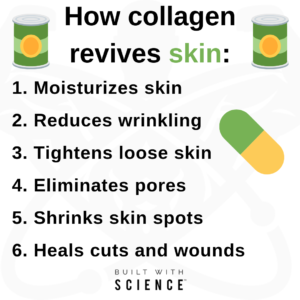
But see here to learn why collagen peptides work so well, and how exactly your skin can reap the benefits. Now, onto body composition:
COLLAGEN AND FAT LOSS
For many years, in light of the obesity epidemic, we’ve been looking for easy ways to burn fat. And after all this time, who’d have thought that collagen supplements would be our best bet?
In fact, many companies claim that collagen peptides can help with fat loss. But the thing is, they’re right.
And it’s clear. When you give people collagen and do nothing else, they lose fat [2,3,4,5,6].
Now, in general, they don’t lose much fat. But the more collagen they take, the more fat they lose (at least to a point). And as time goes on, collagen users seem to lose more and more body fat. That is, the gift may keep on giving...
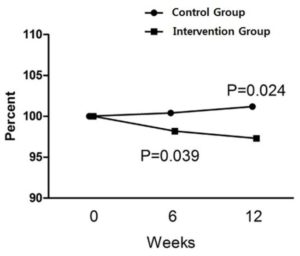
But for now, that’s where we’ll leave it.
If you want to know all the details, then you need to read this article. Where you’ll learn exactly how you can use collagen to burn off all your unwanted fat. Plus, you’ll find out how collagen can help you make better gains…
SUMMARY:
- Every single study shows that when you give people collagen peptides, they lose fat.
- And oddly enough, more collagen is better, at least up to a point.
- But what's more: the longer you use collagen, the more fat it seems to help you lose.
To learn all about collagen peptides for fat loss, or how collagen can help shape your physique, see here.
COLLAGEN AND MUSCLE (STRENGTH AND SIZE)
For years, people have written off collagen as a muscle-building protein. Arguing that it can’t possibly help with muscle growth. And they make some good points.
To start, it doesn’t even have a complete amino acid profile. That is, it won’t give you enough of all the proteins that you need to build muscle.
But moreover, you don’t actually absorb all of the collagen you eat. Hence, it doesn't give you much high-quality protein at all.
And yet, when people take collagen, they gain more lean mass... Time and time again [2,3,4].
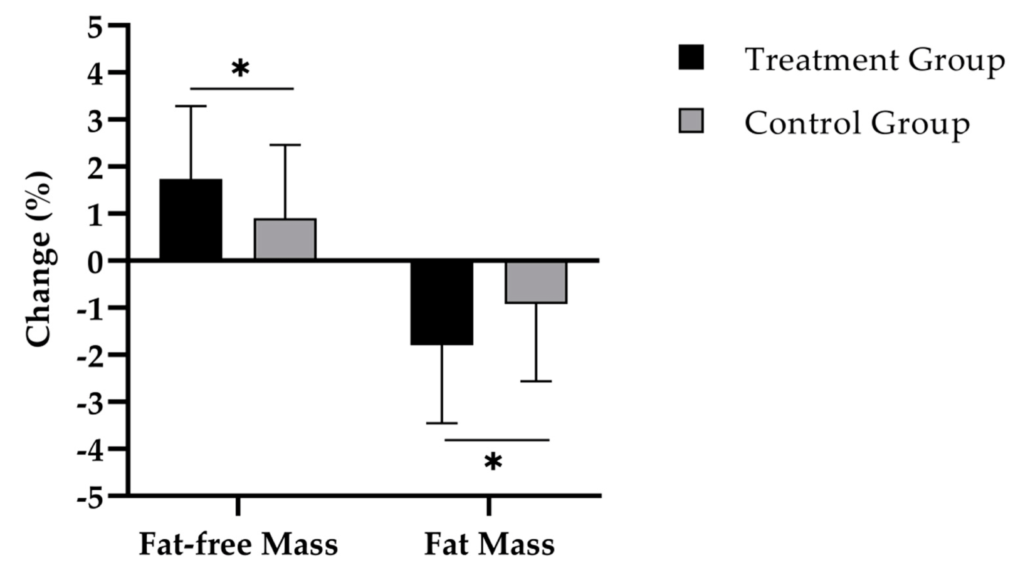
Further though, collagen peptides can help you get stronger too [2,3,4]. And at least to a point, the more collagen you take, the better.
So, what’s going on here? Why are all these people gaining more lean mass with collagen?
Well, collagen peptides can help make you bigger and stronger. There’s no doubt about that.
But, they probably don’t work like you’re thinking. And there are many caveats that you should keep in mind.
So, to explain exactly how collagen peptides help you make gains, we wrote a review on collagen and body composition/strength. There, you can find out if collagen is the most slept on muscle-builder, or just a hyped-up protein powder…
SUMMARY:
- Many studies show that collagen can help you gain more lean mass.
- In fact, every training study shows that collagen can help you get bigger... And stronger.
- But truly, context matters. As collagen peptides probably don’t help like you’d hope they would.
Hence, to learn whether collagen can help you make better gains or not, read this.
COLLAGEN, JOINT HEALTH, AND INJURY RISK
As you’ve learned, our connective tissues tie our muscles to our bones. And above all, they make our joints strong and flexible.
Plus, our cartilage, ligaments, bones, and tendons are largely made up of collagen in dry weight. Thus, most of the protein in our joints is collagen.
Again, collagen makes our bodies more resistant to stretch. Which can help keep our connective tissues more durable.
But we lose collagen when we age, and this often leads to problems...
You see, without support from collagen, our joints pay a steep price. In fact, they grow weak and break down faster over time. Which can be really bad for us...
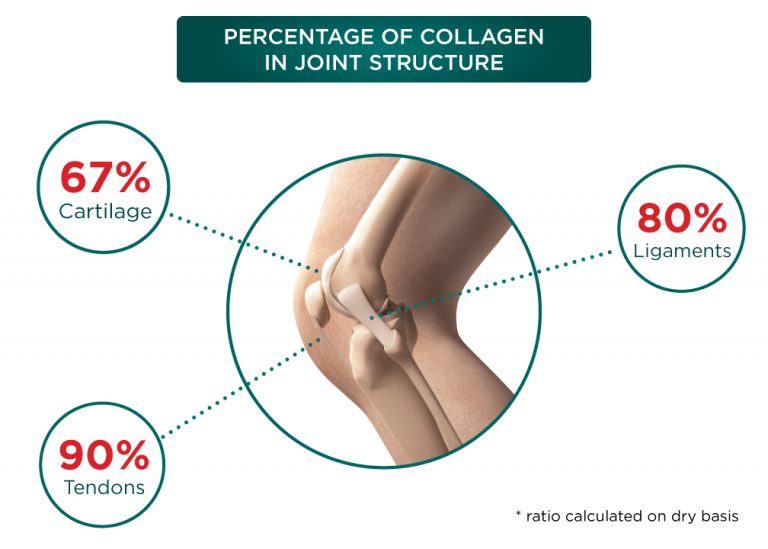
WHY THIS MATTERS
In brief, with weak joints, we’re left more prone to joint pain and injuries. Which for athletes and the elderly, matters quite a bit.
You see, as an athlete, injuries could actually end your career. If not trouble you for the rest of your life, at that. So staying healthy is very, very important. To be clear, you need to avoid injury, or recover quickly if you’ve been hurt.
And with age, your risk of joint pain or cartilage decay goes up. Hence, arthritis is a leading cause of disability among older people. But further, if you get hurt at an old age, you could lose your freedom - if not your life...
That is, unless collagen can help:
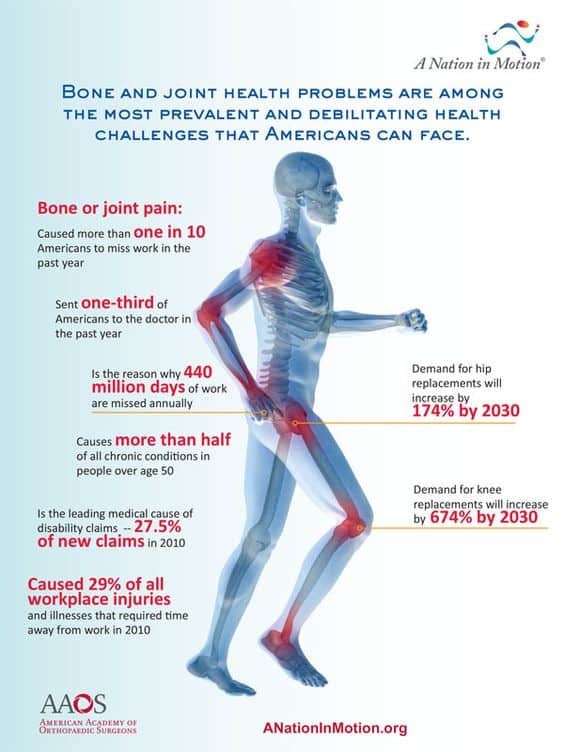
WHY COLLAGEN HELPS
Luckily, by boosting collagen synthesis, collagen peptides can help you avoid injuries…
That is, hydrolyzed collagen can help you recover from injuries faster - with less pain and swelling. But further, it helps you avoid future injuries too.
Plus, many studies show that collagen can reduce joint pain [2,3,4,5,6,7,8,9,10,11,12]. And as such, collagen may help improve physical function. But oddly enough, it can even help if you’re not injured.
Lastly though, collagen peptides can help strengthen your bones as well [2,3,4]. Of course, stronger bones are less likely to break. So again, this is huge for athletes and the elderly.
All told, collagen can help you avoid joint injuries. And in fact, it helps with any pains - from broken bones to torn tendons. Or even just general joint pain.
But with that said, the “full picture” is a bit more complex...
For instance, how much collagen should you take?
Or, when? And in what context?
Which type of collagen works best?
It’s not so simple. So, we wrote a detailed overview on collagen and joint health.
Thus, if you plan to use collagen peptides for joint health, then you’ll want to read this…
SUMMARY:
- With age, we lose collagen. And without support from collagen, our joints break down faster.
- This is a huge issue. Mostly since it makes us more prone to pain and injuries over time.
- But luckily, collagen supplements can help heal injuries and cut down recovery time. Plus, collagen helps make our bones stronger and fights joint pain as well.
- Thus, collagen peptides can help athletes and the elderly - or anyone else at risk of pain and injury.
But to learn exactly how collagen helps you stay pain-free and healthy, see here. And for now, let's see how collagen peptides can help with your well-being:
COLLAGEN AND WELL-BEING
Here’s an area where we don't have many studies, sadly. But, the results that we do have might shock you.
While nobody's tested its direct effects on the brain, collagen can help boost your mood for sure.
For example, 70% of collagen users in this study saw greater well-being. But further, 83% had higher energy levels, and 93% wanted to keep on using collagen powder. (Although, not everyone likes using collagen.)
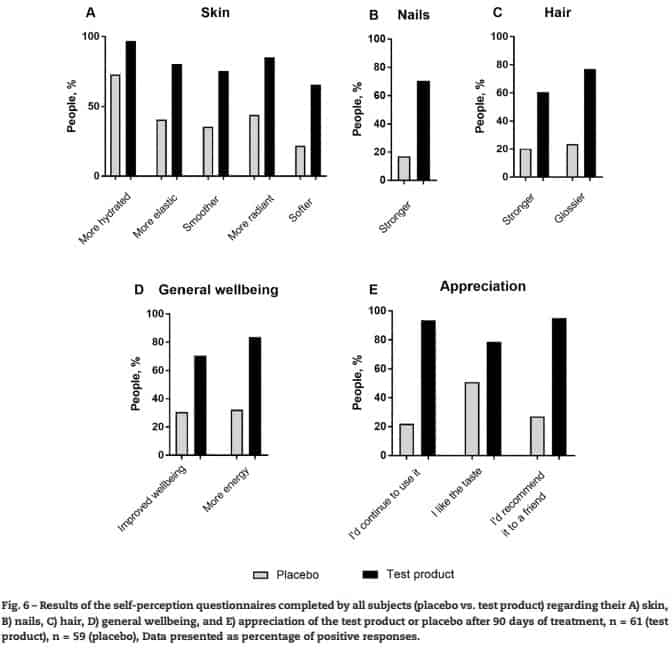
What’s more though, they had very good reason to keep using collagen. Since after 90 days, they had seen many different health improvements...
For one, they had better skin hydration, elasticity, smoothness, radiance, and softness. But moreover, they seemed to have stronger nails, glossier hair, and less joint pain too. That is, when compared to a control group.
So all told, collagen seems to boost well-being and energy levels. And this may be due to all the other benefits of collagen, as laid out above.
But note, the above study does not stand alone. As in fact, 2 other studies found the same results. For in each case, collagen users rated their quality of life to be higher [1,2].
And just thinking about it, of course collagen could help with mood…
WHY MIGHT COLLAGEN IMPROVE WELL-BEING?
Imagine; your joints are achy, stomach large, bones weak; skin dry, cracked, and wrinkled.
Then, all of the sudden, collagen comes along...So day by day, your issues start to pass on.
Your joints and bones start to feel stronger. Then your skin becomes tighter, smoother, and softer. And to top it off, your weight starts dropping slowly. Mind you, all with no extra effort on your part.
Who wouldn’t be happy about that? I mean, of course you would feel good about aging well.
So all told, it's no shock that collagen can help make you feel better. Since when you take collagen peptides, the ill effects of aging begin to fade away.
And really, it’s as simple as that. So let’s wrap this article up with some practical guidelines...
SUMMARY:
- Studies on collagen peptides and well-being are scarce. But early studies are very promising.
- Collagen peptides seem to help make you feel better. As in fact, ~70% percent of test subjects respond well to collagen. Truly, they have better well-being, higher energy levels, and desire to keep using collagen.
- Plus, collagen give you many benefits that alone could help you feel better. For example, collagen supplements fight joint pain, strengthen nails, and make skin look nicer too.
- So, it’s no shock that collagen peptides can help you feel better. They have many anti-aging benefits that could easily boost your well-being. And all for very little effort on your part, no less.
TAKEAWAY
So, you’ve reached the end of the article. Congrats. That means you’ve learned all about the many benefits of collagen peptides. But, that was a lot of reading, so we’ll briefly re-hash here:
WHAT IS COLLAGEN AGAIN?
Collagen is the most common protein in the human body. Where it helps keep our skin, bones, and joints healthy over time.
But you can find collagen in food too. For example, you get some collagen when you eat pig skin.
Sadly though, there aren’t many collagen rich foods that most people eat. So in most cases, collagen refers to a protein supplement.
That is, collagen hydrolysate. Which gives you many benefits, and few side effects (see FAQ).
You see, when you take collagen peptides, your body makes more collagen. Or in other words, collagen synthesis goes up. And this explains all the benefits of collagen. As we've listed out down below:
THE BENEFITS OF COLLAGEN
Mostly because it boosts collagen synthesis, collagen powder can help:
- Revive your skin
- Burn fat
- Strengthen/grow your bones and nails
- Support connective tissue health and function
- Fight joint pain
- Speed up recovery from injuries
- Enhance lean mass and strength gains
- Boost well-being and mood (in part given the above benefits)
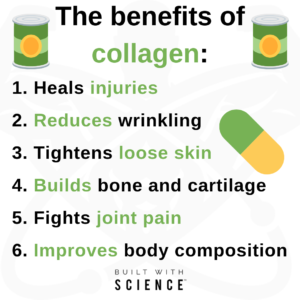
So there you have it...Collagen peptides can, in fact, help reverse aging. At least, in some ways.
But there’s a major point we’re missing here:
At the end of the day, collagen is only a supplement. So all told, it should complement a healthy overall lifestyle.
Truly, living a low-stress life with lots of exercise, a good diet, and great sleep, is the best way to fight aging. And while collagen can help, it can’t replace a good lifestyle. Not nearly.
Hence, don’t just add collagen peptides to your diet and expect the world. They work best when combined with other healthy habits...
So if you want to set up your diet to get the most out of collagen, then read this to find out how many calories you should be eating.
Now, with that said, let’s see how much collagen you should take, for your specific goals:
HOW MUCH COLLAGEN SHOULD I TAKE?
In the end, the amount of collagen you should take depends on your goal. But, we have in-depth articles on how to use collagen for body composition, injury management, and skin care. So here, we’ll just go over general health:
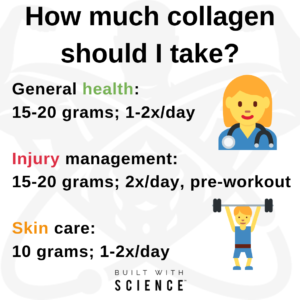
GENERAL HEALTH AND WELL-BEING
To improve health, take at least 15-20 grams of hydrolyzed collagen per day. Whenever, and however you’d like to (ideally 2x daily).
If you choose to take collagen 2x/day, then you should wait 6+ hours between collagen feedings. So, if you take collagen at noon, wait until ~6 pm before doing so again.
This is because collagen levels die down in our blood after 7-12 hours, and peak at ~60-120 minutes.
Then, you should take ~15-20 grams of collagen peptides each time. Since this dose is known to max out collagen synthesis. And thus, it should get you the most benefits as well.
PRACTICAL EXAMPLE:
Bob wakes up at 9 am, then takes 15-20 grams collagen with breakfast. Next, he waits ~6 hours before taking another 15-20 grams of collagen powder (now after 3 pm).
Bob sometimes trains in the morning. On these days, he trains at 10 am, ~60 minutes after taking collagen.
But, other times he trains in the afternoon. In this case, Bob still takes 15-20 grams of collagen, about an hour before he trains (at ~4:30 pm).
And then on some days, Bob just won’t train. Either way, he takes collagen once in the morning and afternoon. Or, if he can only take collagen once that day, he’ll have at least 20 grams.
So, ideally, be like Bob. But if that all sounds hard, just take 20 grams of collagen per day. Whenever you can - since that’s much better than nothing.
Don’t know how you can fit collagen into your daily life? Our 3-on-1 coaching program can help. You are going to have a dietitian who’ll customize your nutrition plan (so you get all the collagen you need!) to suit your goals. Plus, your coach and I will also be available to guide you every step of the way. If that sounds good to you, then:
Click the button below to find out more about the 3-on-1 coaching program:
↓
HOW TO TAKE COLLAGEN?
Now, you may be wondering: how should I use collagen peptides?
Just take it as powder? Or mix it into water? Should I take it in pill form?
Well luckily, collagen works very well as a powder, or when mixed into liquid. And it can work well in pill form too.
So, take collagen however you like; as powder, with food, or with beverages. For reference, we give some examples in the graphic below:
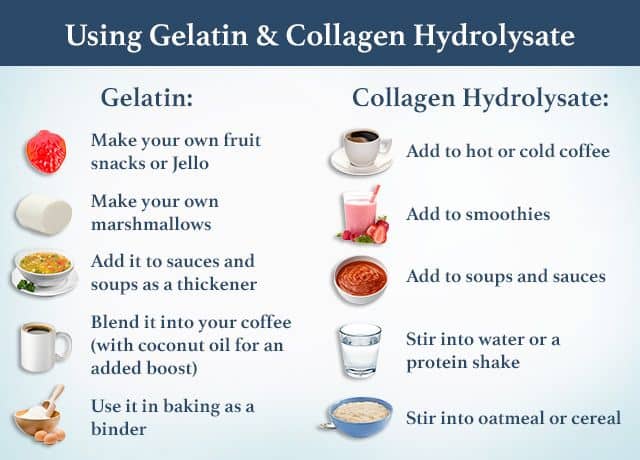
Now, many people ask whether gelatin provides the same benefits as collagen. And so, we’ve gone over that first in the FAQ section (below).
But, before we get into that, let’s wrap this article up with some key points:
KEY TAKEAWAYS
- Collagen peptides can help reverse the aging process. Since they help restore our bodies in many ways.
- Collagen alone won’t make sure that you'll age well. So you should pair collagen with good exercise, diet, sleep, and lifestyle habits.
- But with that said, collagen powder can help you get better results in time; making your skin nicer, joints stronger, and/or waist smaller, among other things.
- So to max out the benefits, take 15-20 grams of collagen, 1-2x daily. Ideally, with one dose pre-workout, and another coming 6 hours away (either earlier or later in the day).
FAQ:
1. COLLAGEN VS. GELATIN
In general, collagen hydrolysate and gelatin are very similar. But, they are not the same thing.
First off, they’re made through different processes. But further, they have different chemical makeups as well.
HOW IS GELATIN MADE?
To make gelatin, all you do is boil a natural collagen source. That is, you take an animal (skin, bones, tendons, etc.) and boil it in water.
Then, after cooling this broth, gelatin forms.
HOW IS COLLAGEN MADE?
On the other hand, to make hydrolyzed collagen, you first need to make gelatin. As when you process gelatin (with enzymes or acid), you get collagen hydrolysate.
Thus, collagen and gelatin are different.
HOW ARE THEY DIFFERENT?
First off, while similar, collagen and gelatin are distinct proteins. As such, they have slightly different amino acid profiles.
So, one might have more of any given amino acid. For example, gelatin has a bit more leucine.
Plus, collagen hydrolysate is more soluble than gelatin. Hence, while hydrolyzed collagen dissolves in water, gelatin does not.
And so gelatin won’t mix with your favorite drink, sadly. But on the bright side, hydrolyzed collagen might.
Now with that said, the two proteins are similar enough.
For example, in mice, both proteins enter the connective tissues. That is, they each get absorbed by the body.
And for humans, the two proteins boost collagen synthesis similarly. Which means they both help the body make more collagen.
So all told, collagen hydrolysate and gelatin may provide the same benefits. And for most purposes, you can just swap one out for the other.
That’s why in practice, which one you take doesn't matter a ton. Just so long as you enjoy using one regularly, then collagen vs. gelatin shouldn’t make much difference.
2. WHICH FOODS CONTAIN THE MOST COLLAGEN?
Sadly, collagen is pretty rare in the modern diet. So to get enough, odds are that you'll need to supplement.
But with that said, you can get some collagen from your diet. As collagen rich foods include pork skin, beef tendon, beef bone, or fish skin, for instance.
The thing is, people just don’t consume many collagen rich foods these days. For example, the most common collagen rich foods only contain 0.2-2.5 grams of collagen per serving (e.g. meat/fish). Yet, the “optimal” collagen dose is at least 20 grams per day.

So, to get enough collagen, you shouldn’t rely on food alone. Because most good dietary collagen sources are a pain to find and eat...
To illustrate, how often would you want to eat chicken neck?
Or rat tail tendons?
How about frog skin?
If you eat these foods daily, then collagen powder might not help you. But if you eat a standard diet, then you should still supplement. Since that way, you'll reap all the benefits of collagen.
Or, if you want, you could more or less replace collagen peptides with gelatin.
That’s right. Jell-O (sugar-free, specifically) can help with collagen synthesis. Just like collagen can.
And given their shared benefits, you can use either one. So, if you like eating Jell-O more than collagen, then go for it.
But with that said, you’d need to eat lots of Jell-O to replace collagen powder (e.g. 6-10 containers per day).
Hence, buying collagen powder might be less costly, and more practical for most.
3. DOES COLLAGEN WORK BEST WITH VITAMIN C?
Sadly, we don't know if we should take vitamin C with collagen or not.
On a mechanistic level, vitamin C should help your body make collagen. But, human studies don’t quite support this idea:
For example, adding vitamin C to collagen might not help with skin health.
So, if your diet gives you enough vitamin C, then no need to worry. But on the other hand, it couldn’t hurt to take collagen with vitamin C. Especially if you don’t eat enough vitamin C in general.
Now note, things may change after an overnight fast. That is, after sleeping.
You see, when you take in vitamin C, it stays in your blood for hours. Yet, when you've fasted for a long time, there’s no vitamin C left from your last meal. Thus, eating some vitamin C with collagen may be more important.
So to play it safe, if you take collagen before you eat breakfast, then have some vitamin C too.
4. HOW LONG DO COLLAGEN SUPPLEMENTS TAKE TO WORK?
Collagen powder starts working almost instantly. But, it may take a while before you notice any benefits.
With skin, for instance, people can see benefits in as few as 3 weeks. As for one, collagen can help get rid of wrinkles that quickly. And after 90 days, subjects in this study had better skin hydration, elasticity, smoothness, radiance, and softness.
Although, for fat loss, it can take more like 12 weeks to see notable benefits. That is, if you notice any fat loss at all, given daily shifts in your body weight and water storage.
Then, if you're injured and now trying to recover, you may notice benefits. But in real life, it’s tough to tell if or why an injury has started recovering faster. Hence, you might notice less pain and swelling, or better joint function. But it’s hard to say for sure.
And lastly, you won’t notice any connective tissue or bone growth. But, you might see less joint pain. To illustrate, subjects in this study had less joint pain than usual within 30 days of using collagen.
So all told, if you notice the benefits of collagen, it would most likely be for joint pain and skin. Or perhaps, for changes in hair and nails.
And luckily, that might work in your favor:
If you respond well to collagen, then you’ll see the benefits. So look out for improved wrinkling, nail health, or joint pain. And if you don’t notice any changes after ~3 months, then you may respond poorly to collagen.
5. DO COLLAGEN PEPTIDES HAVE ANY SIDE EFFECTS?
For some people, collagen peptides have side effects. But, most of us never need to worry about side effects from collagen.
To be clear, most studies find no side effects [2] with collagen supplements. So, most of us tend to tolerate collagen very well.
But sadly, some of us are allergic to collagen peptides. And of course, these people see some bad side effects.
In fact, studies have found 2 cases of collagen allergies. In one case, somebody saw swelling in their arms and legs. While in the other, a subject had skin rashes.
Other than that though, collagen is quite safe. I mean, some people see side effects early on with collagen. But any side effects pass very quickly.
That is, some people struggle with diarrhea, the cold, or vomiting upon first trying collagen. But luckily, these side effects pass in just days. Plus, it’s not clear that collagen causes these effects to begin with.
Hence, you may get nausea, diarrhea, flatulence, or indigestion at first. But this will pass if you keep on using collagen.
Now with that said, odds are you won’t see any side effects with collagen peptides. And of course, stop taking collagen if you don't respond well.
Lastly, you might not like the way that collagen tastes. Plus, some people say the taste lingers in their mouth afterward.
6. ARE COLLAGEN PILLS ANY GOOD?
Sadly, most collagen pills are under-dosed. Hence, they don't give you much collagen. At least, not for the price.
Studies find that you need at least 15-20 grams per day to get all the benefits of collagen. So we’ll call 15-20 grams an “effective dose.”
Just looking around, most collagen pills have about 2.5 grams of collagen per pill. So, to get all 15-20 grams, that’s 6-8 pills per day, from a bottle with 60 tablets. Or in other words, 10 effective doses at most.
Thus, a bottle of collagen pills lasts you just 10 days, if you take an effective dose (i.e. 15-20+ grams/day).
But, a tub of collagen powder tends to costs less than a bottle of collagen pills. And further, they often give you ~10-20 ounces per container. That is, ~15-35 effective doses of collagen, versus just 10.
As such, collagen pills are way more expensive.
If you take 15-20 grams of collagen from pills, then a container might last you 10 days. But for less money, collagen powder lasts for ~15-30 days. So hydrolyzed collagen powder costs much less.
But with that said, if you prefer the pills, they can definitely work well too.
7. ARE COLLAGEN SUPPLEMENTS VEGETARIAN?
Most of the time, no, they're not. Yet, some vegan collagen products have recently surfaced.
In general, collagen is unique to animals; found in skin, bones, hair, nails, and connective tissues. Thus, collagen supplements had never been vegan.
But, it turns out that these days, you can make collagen from bacteria. So today, vegans may be able to reap all the benefits of collagen too.
As a vegan, you’ll just have to take care when you shop for collagen. Since if it isn’t clearly sold as vegan collagen, then it is not vegan.
8. CAN COLLAGEN CAUSE CANCER?
Sadly, we don't have any studies on collagen and cancer risk. At least, not in humans. So, we can’t say for sure.
But, the research on rodents is pretty promising; showing that collagen can even help combat cancer.
Now, you certainly should not take collagen as to reduce your risk of cancer. But with that said, collagen is very unlikely to increase your disease risk. Especially given its many health benefits.
9. WHICH COLLAGEN IS BEST? MARINE VS. BOVINE VS. PORCINE
To be clear, we don't have many studies here. But early results show that bovine and porcine collagen are better for skin.
And in fact, pork collagen both re-hydrates skin and shrinks sun spots faster than fish collagen.
Thus, porcine collagen is your best bet, at least for skin health.
Moving on, we see that pork and beef collagen help with joint pain similarly. But to this point, no studies have compared beef collagen to fish collagen. So, we can’t say that beef is better than fish collagen for sure. (Yet, if I had to guess, I'd say it is.)
So all told, porcine collagen works well for joint pain and skin care. That is, better than fish collagen, and at least as well as beef collagen works.
But with that said, any collagen will work. It just seems like pork or beef collagen would work a bit faster than fish collagen.
10. WHEN TO TAKE COLLAGEN PROTEIN?
For the best of all worlds, you should take collagen ~60-120 minutes pre-workout.
And to hedge your bets, you could take collagen again 6 hours later. Or, 6 hours earlier, if you train in the evening.
This is because pre-workout collagen may help you avoid injuries. Also, since collagen peaks in the blood ~60-120 minutes after you take it. Then, it remains in your system for another 6-12 hours.
Thus, you should spread collagen feedings apart by ~6+ hours or so. That is, if you plan to take collagen twice per day.
Now, in theory, taking collagen 2x/day should work better. Since this would get you more collagen synthesis. But we don’t have any studies to tell us that for sure.
11. IS HYDROLYZED COLLAGEN GOOD FOR GUT HEALTH?
Despite what many collagen companies might claim, there are no studies on collagen for gut health. Or at least, not in humans.
Indeed, there are literally no human studies on collagen and gut health. Although, there are a few studies on rodents [1,2]. But we shouldn’t extend these findings to humans. That is, not until we have research done on people.
Now, this doesn’t mean that collagen can’t help you with gut health. But, we just don't have any huma research right now. And so we can't say much about collagen and human gut health. At least, not yet.
12. COLLAGEN AND HEART HEALTH: CARDIOVASCULAR DISEASE RISK
Believe it or not, collagen might help you avoid heart disease.
You see, collagen provides support to our arteries, keeping them strong and stable. But in time, we age, and lose lots of collagen.
And at the same time, our arteries narrow; as is common with heart disease. In fact, clogged arteries are the main cause of heart disease and stroke.
So, one study put collagen to the test - to see if it could help keep arteries from narrowing. And what do you know?
Collagen helped with arterial stiffness, while improving other heart disease risk factors as well. Which, to be clear, is good.
Plus, research shows that collagen can help with weight loss too. Thus, collagen may help lower cardiovascular disease risk indirectly, via weight loss. Since being too heavy has been shown to raise your risk of heart disease.
But with all that said, not all studies find benefits with collagen. As in fact, one study found that collagen worsened the HDL/LDL ratio - a risk factor for heart disease.
So all told, we need more studies on collagen and heart disease. We have some reason to think collagen would lower heart disease risk. But results from different studies conflict. And thus, to know for sure, we need more data.
And for those looking for a complete step-by-step program that uses science to show you how to properly train AND eat AND supplement week after week to transform your body in the most efficient and injury-free way possible, then:
Click the button below to take my analysis quiz to discover the best program for you:
↓

